- Home
- P. D. James
Death in Holy Orders Page 29
Death in Holy Orders Read online
Page 29
There was a pause. Dalgliesh said, “Thank you, Father. That agrees with the account given by Dr. Stannard.”
Father Sebastian said, “Forgive me if I’m intruding on your field of responsibility, but the fact that Stannard was hidden in the church on Saturday afternoon doesn’t mean that he didn’t return late that night. Do I take it that you have exonerated him from the inquiry?”
Dalgliesh had no intention of revealing that Stannard had been ignorant of how the Archdeacon had died. He was wondering whether Father Sebastian had forgotten the significance of the missing key, when the Warden said, “Obviously having made a copy of the key, he didn’t need to take one from the office. But surely he could have done that simply to throw suspicion elsewhere.”
Dalgliesh said, “That would be to assume, of course, that the murder was planned in advance and was not an impulse of the moment. Stannard isn’t exonerated at present no one is but I’ve told him that he can leave and I imagine that you’ll be glad to see the last of him.”
“Very glad. We were beginning to suspect that his explanation for being with us, his research into the domestic life of the early Tractarians, was a cover for another interest. Father Peregrine in particular was suspicious. But Stannard’s grandfather was a senior partner in the firm of solicitors who had dealt with the college since the nineteenth century. He did a great deal for us and we were loath to disoblige his grandson. Perhaps the Archdeacon was right; we are too apt to be in thrall to our past. My meeting with Stannard was not comfortable. His attitude was a mixture of bluster and sophistry. He offered a not unusual excuse for cupidity and dishonesty: the sanctity of historical research.”
Father Martin hadn’t spoken during the whole of the interview. He and Dalgliesh left the outer office in silence. Once outside he stopped short and asked, “Would you like to see the Anselm papyrus?”
“Yes, very much.”
“I keep it in my sitting-room.”
They climbed the circular staircase to the tower. The view was spectacular but the room wasn’t comfortable. It gave the impression of being furnished with odd pieces too old to be on public view but too good to throw away. Such an expedient jumble can produce an atmosphere of cheerful intimacy, but here it was depressing. Dalgliesh doubted whether Father Martin even noticed.
On the wall which faced north there was a small religious print in a brown leather frame. It was difficult to see clearly, but at first sight it had little artistic merit and the colours were so weak that it was difficult to make out even the central figure of the Virgin and Child. Father Martin took it down and slid off the top of the frame. He drew out the print. Beneath it were two panes of glass, and between them what looked like a sheet of thick cardboard, cracked and broken at the edges and covered with rows of scratched and spiky black lettering. Father Martin didn’t carry it over to the window and Dalgliesh had difficulty in deciphering any of the Latin except for the superscription. There seemed to be a round circular mark in the right-hand corner where the papyrus had broken away. He could clearly see the crisscross of the compounded reeds from which it was made.
Father Martin said, “It has only been examined once, and that soon after Miss Arbuthnot received it. There seems no doubt that the papyrus itself is old, almost certainly dating from the first century AD. Her brother Edwin would have had no difficulty in getting hold of it. He was, as I expect you know, an Egyptologist.”
Dalgliesh said, “But why did he hand it over to his sister? It seems a curious thing to have done whatever its provenance. If it was faked to discredit her religion, why keep it secret? If he thought it was genuine, wasn’t that an even better reason for making it public?”
Father Martin said, “That’s one of the chief reasons why we’ve always regarded it as a fake. Why part with it when, if genuine, he would have got fame and prestige from its discovery? He may, of course, have wanted his sister to destroy it. He had probably kept photographs and, had she done so, could have accused the college of deliberately destroying a papyrus of incomparable importance. She was probably wise to act as she did. His motives are less explicable.”
Dalgliesh said, “There’s also the question of why Pilate would bother to put the command in writing. Surely a word in the right ear would have been the normal way.”
“Not necessarily. I don’t have the same difficulty with that.”
Dalgliesh said, “But the matter could now be settled one way or the other, if that’s what you wish. Even if the papyrus dates back to the time of Christ, the ink could be carbon-dated. It’s possible now to know the truth.”
Father Martin, with great care, was putting the print and the frame together again. Finally he hung the picture on the wall and stood back assessing that he had replaced it evenly. He said, “You believe then, Adam, that the truth can never hurt.”
“I wouldn’t say that. But I believe we have to search for it, however unwelcome it may be when we find it.”
“That’s your job, a searching for truth. You never get the whole truth, of course. How could you? You’re a very clever man but what you do doesn’t result in justice. There’s the justice of men and the justice of God.”
Dalgliesh said, “I’m not that arrogant, Father. I limit my ambition to the justice of men, or as close to it as I can get. And even that isn’t in my hands. It’s my job to make an arrest. The jury decide on guilt or innocence; the judge sentences.”
“And the result is justice?”
“Not always. Perhaps even not often. But in an imperfect world it may be as close to it as we can get.”
Father Martin said, “I’m not denying the importance of truth. How could I? I’m simply saying that the search for it can be dangerous, and so can the truth when it’s discovered. You suggest that we should have the Anselm papyrus examined, the truth established by carbon dating. But that wouldn’t stop the controversy. People would argue that the papyrus is so convincing that it must be a copy of an earlier and genuine one. Others would choose not to believe the experts. We would face years of damaging controversy. There would always be something mysterious about the papyrus. We don’t want to set up another Turin Shroud.”
There was a question which Dalgliesh wanted to ask but he hesitated, aware of its presumption, aware too that once spoken it would be answered honestly and perhaps with pain.
“Father, if the papyrus were examined and it were possible to know with almost complete certainty that it was genuine, would that make a difference to your faith?”
Father Martin smiled. He said, “My son, for one who every hour of his life has the assurance of the living presence of Christ, why should I worry about what happened to earthly bones ?”
In the office below, Father Sebastian had asked Emma to come and see him. Sitting her in a chair, he said, “I expect you wish to go back to Cambridge as soon as possible. I’ve spoken to Mr. Dalgliesh and he says that he has no objection. I understand that at present he has no power to keep anyone here who wishes to leave provided the police know how to contact them. There’s no question, of course, of any of the priests or ordinands leaving.”
Irritation amounting to outrage made Emma’s voice sharper than she realized.
“You mean that you and Mr. Dalgliesh have been discussing what I should or should not do! Father, isn’t that for you and me to decide?”
Father Sebastian bent his head for a moment, then looked her in the eyes.
“I’m sorry, Emma, I’ve expressed myself clumsily. It wasn’t like that. I rather assumed that you would wish to leave.”
“But why? Why should you assume that?”
“My child, there’s a murderer among us. We have to face that. I should be easier in my mind if you were not here. I know that we have no reason to suppose that any of us is in danger at St. Anselm’s but it can’t be a very happy or peaceful place for you, for anyone.”
Emma’s voice was more gentle.
“That doesn’t mean I want to leave it. You said that the college should con
tinue with its daily life as far as possible. I thought that meant I would stay and give my usual three seminars. I don’t see what that has got to do with the police.”
“Nothing, Emma. I spoke to Dalgliesh because I knew you and I would have to have this discussion. Before doing so I thought I ought to find out whether any of us is in fact free to leave. It would have been pointless to discuss your wishes until I’d ascertained that. You must forgive my tactlessness. We are all to some extent the prisoners of our upbringing. I’m afraid my instinct is to thrust women and children into the lifeboats.” He smiled, then said, “It’s a habit my wife used to complain of.”
Emma asked, “What about Mrs. Pilbeam and Karen Surtees? Are they leaving?”
He hesitated and gave a rueful smile. Emma was even able to laugh.
“Oh Father, you aren’t going to tell me that they are both all right because they have a man to protect them!”
“No, I wasn’t proposing to aggravate my offence. Miss Surtees has told the police that she intends to remain with her brother until an arrest is made. She may be here some time. I take it that it will be she who will be doing the protecting. I have suggested to the Pilbeams that Mrs. Pilbeam should visit one of her married sons but she asked with some asperity who in that case would be doing the cooking.”
Emma was struck with an uncomfortable thought. She said, “I’m sorry I was so sharp and perhaps I’m being selfish. If it would be easier for you for everyone if I left, then of course I’ll go. I didn’t mean to be a bother, or to increase your anxieties. I was just thinking of what I wanted.”
“Then please stay. Your presence, particularly for the next three days, may add to my anxiety, but it will immeasurably add to our comfort and peace. You have always been good for this place, Emma. You are good for it now.”
Again their eyes met and she had no doubt of what she saw in his: pleasure and relief. She looked away, aware that he might discern in her eyes a less acceptable emotion: pity. She thought, he’s not young and this is terrible for him, perhaps the end of everything he’s worked for and loved.
Lunch at St. Anselm’s was a simpler meal than dinner, consisting generally of soup followed by a variety of salads with cold meats and a hot vegetarian dish. Like dinner, it was eaten partly in silence. Today the silence was particularly welcome to Emma and, she suspected, to everyone present. When the community was together silence seemed the only possible response to a tragedy that in its bizarre horror was as much beyond speech as it was beyond comprehension. And silence at St. Anselm’s was always a benison, more positive than the mere absence of speech; now it invested the meal with a brief illusion of normality. Little was eaten, however, and even the soup bowls were pushed aside half empty while Mrs. Pilbeam, white-faced, moved among them like an automaton.
Emma had planned to return to Ambrose to work but knew that concentration would be impossible. On an impulse which at first she found difficult to explain, she decided to see if George Gregory was in St. Luke’s Cottage. He wasn’t always resident in college when she visited, but when he was they were easy in each other’s company without ever being intimate. But now she needed to talk to someone who was in St. Anselm’s but not of it, someone with whom she need not weigh every word. It would be a relief to be able to discuss the murder with someone she suspected would find it more intriguing than personally distressing.
Gregory was at home. The door of St. Luke’s Cottage stood open and even as she approached she could hear that he was listening to Handel. She recognized the tape as one she owned herself, the counter-tenor James Bowman singing Ombra Mai Fu. The voice of exquisite beauty and clarity swelled out over the headland. She waited until the music ended and even as she lifted her hand to the knocker he called out for her to come in. She passed through his ordered book-lined study and into the glass extension overlooking the headland. He was drinking coffee and the rich smell of it filled the room. She hadn’t waited for coffee in college, but when he offered to fetch a second cup she accepted. He placed a small table beside the low wicker chair and she leaned back, surprisingly glad to be there.
She had come with no clear ideas, but there was something she needed to say. She watched him as he poured the coffee. The goatee beard gave a slightly sinister Mephistophelean look to a face which she had always thought more handsome than attractive. He had a high sloping forehead from which the fair hair sprang back in waves so regular that they looked as if they had been produced by heated rollers. Under thin lids his eyes regarded the world with an amused or ironic contempt. He looked after himself. She knew that he ran daily and swam, except in the coldest months of the year. As he handed her the cup she saw again the deformity which he never made any attempt to conceal. The top half of the third finger on his left hand had been chopped off in adolescence in an accident with an axe. He had explained the circumstances to her at their first meeting and she had realized that he needed to emphasize that it had been an accident and his own fault, not a birth defect. It had surprised her that he should so obviously resent and feel it necessary to explain a deformity that could hardly inconvenience him. It was, she thought, a measure of his self-regard.
Now she said, “There’s something I want to consult you about no, that’s the wrong word something I need to talk over.”
‘I’m flattered, but why me? Wouldn’t one of the priests be more appropriate?”
“I can’t worry Father Martin with it and I know what Father Sebastian would say at least I think I know, although he can be surprising.”
Gregory said, “But if it’s a moral question, they’re supposed to be the experts.”
“I suppose it is a moral question at least, it’s an ethical question -but I’m not sure I want an expert. How far do you think we ought to co-operate with the police? How much should we tell them?”
“That’s the question, is it?”
“That’s the question.”
He said, “We may as well be specific. I suppose you do want Crampton’s murderer caught? You haven’t any problem with that? You don’t feel that in certain circumstances murder ought to be condoned ?”
“No, I never feel that. I want all murderers caught. I’m not sure I
know what ought to happen to them afterwards, but even if one feels empathy for them perhaps even sympathy I still want them caught.”
“But you don’t want to take too active a part in the catching?”
“I don’t want to hurt the innocent.”
“Ah,” he said, ‘but you can’t help it. Dalgliesh can’t help it. That’s what a murder investigation always does, it hurts the innocent. Which particular innocent have you in mind ?”
“I’d rather not say.”
There was a silence, then she said, “I don’t know why I’m bothering you with this. I suppose I needed to talk to someone who isn’t really part of the college.”
He said, “You’re talking to me because I’m not important to you. You’re not attracted to me sexually. You’re content to be here because nothing we say to each other will change the relationship between us; there’s nothing to be changed. You think I’m intelligent, honest, unshockable and that you can trust me. All that is true. And, incidentally, you don’t believe I murdered Crampton. You’re perfectly right, I didn’t. He made virtually no impact on me when he was alive and he makes even less now he’s dead. I admit to a natural curiosity about who killed him, but that’s as far as it goes. And I should like to know how he died, but you’re not going to tell me and I shan’t invite a rebuff by asking. But, of course, I’m involved. We all are. Dalgliesh hasn’t sent for me yet, but I don’t deceive myself that it’s because I’m low on his list of suspects.”
“So what will you say when he does ?”
“I shall answer his questions honestly. I shan’t lie. If I’m asked for an opinion I shall give it with extreme care. I shan’t theorize and I shan’t volunteer information I’m not asked for. I certainly shan’t attempt to do the police’s work for them; they’
re paid enough, God knows. And I’ll remember that I can always add to what I’ve told them, but words once spoken can’t be recalled. That’s what I plan to do. When Dalgliesh or his minions condescend to call I’ll probably be too arrogant or too inquisitive to take my own advice. Is that helpful?”
Emma said, “So you’re saying, don’t lie but don’t tell them more than you need. Wait until you’re asked and then answer truthfully.”
“More or less.”
She asked a question that she had wanted to ask since their first meeting. It was odd that today seemed the right time.
“You’re not in sympathy with St. Anselm’s, are you? Is that because you’re not a believer yourself or because you don’t think they are either?”
“Oh they believe all right. It’s just that what they believe has become irrelevant. I don’t mean the moral teaching; the Judaeo-Christian heritage has created Western civilization and we should be grateful to it. But the Church they serve is dying. When I look at the Doom I try to have some understanding of what it meant to fifteenth-century men and women. If life is hard and short and full of pain you need the hope of Heaven; if there is no effective law, you need the deterrent of Hell. The Church gave them comfort and light and pictures and stories and the hope of everlasting life. The twenty-first century has other compensations. Football for one. There you have ritual, colour, drama, the sense of belonging; football has its high priests, even its martyrs. And then there’s shopping, art and music, travel, alcohol, drugs. We all have our own resources for staving off those two horrors of human life, boredom and the knowledge that we die. And now God help us there’s the Internet. Pornography at the touch of a few keys. If you want to find a paedophile ring or discover how to make a bomb to blow up people you disagree with, it’s all there for you. Plus, of course, a bottomless mine of other information, some of it even accurate.”
Emma said, “But when all these things fail, even the music, the poetry, the art?”

 The Skull Beneath the Skin
The Skull Beneath the Skin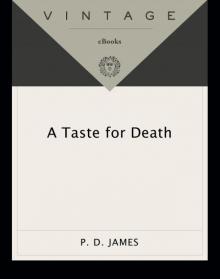 A Taste for Death
A Taste for Death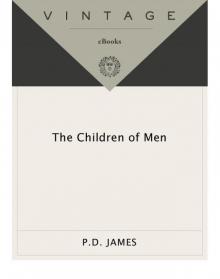 The Children of Men
The Children of Men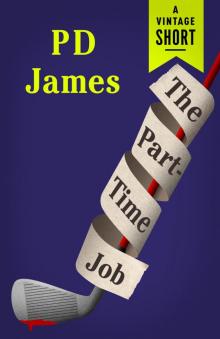 The Part-Time Job
The Part-Time Job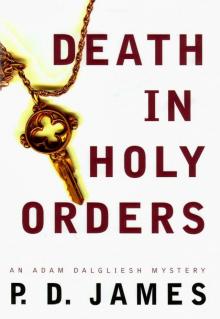 Death in Holy Orders
Death in Holy Orders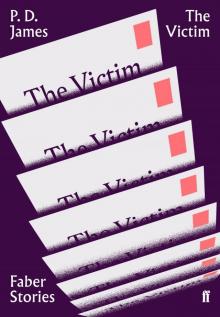 The Victim
The Victim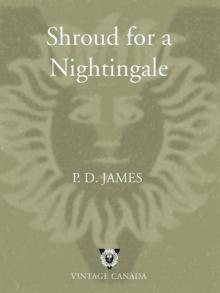 Shroud for a Nightingale
Shroud for a Nightingale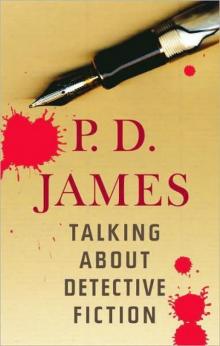 Talking about Detective Fiction
Talking about Detective Fiction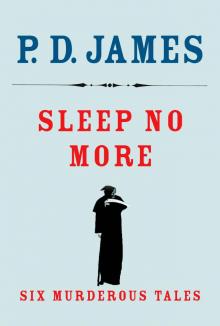 Sleep No More
Sleep No More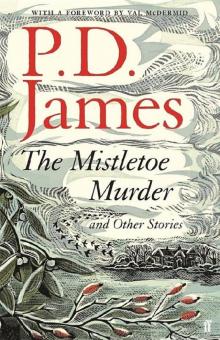 The Mistletoe Murder and Other Stories
The Mistletoe Murder and Other Stories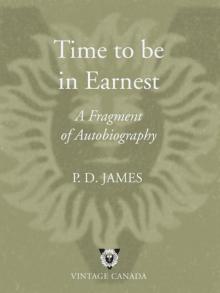 Time to Be in Earnest
Time to Be in Earnest Original Sin
Original Sin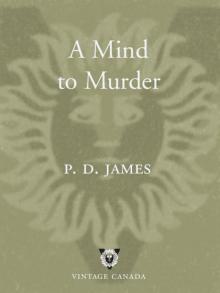 A Mind to Murder
A Mind to Murder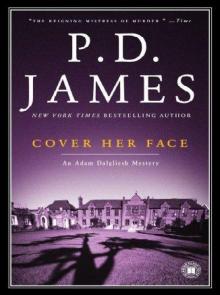 Cover Her Face
Cover Her Face Innocent Blood
Innocent Blood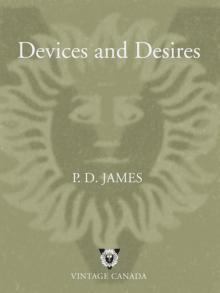 Devices and Desires
Devices and Desires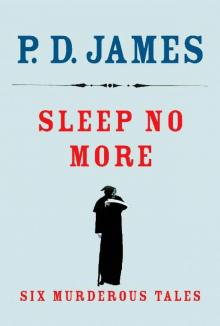 Sleep No More: Six Murderous Tales
Sleep No More: Six Murderous Tales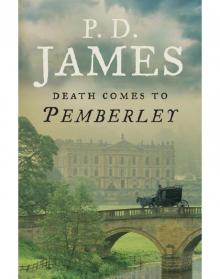 Death Comes to Pemberley
Death Comes to Pemberley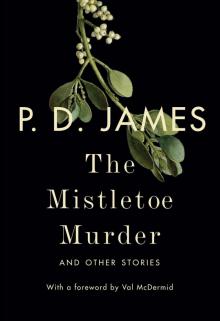 The Mistletoe Murder
The Mistletoe Murder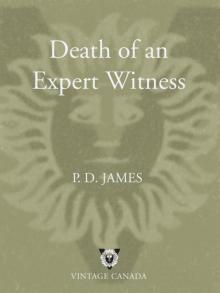 Death of an Expert Witness
Death of an Expert Witness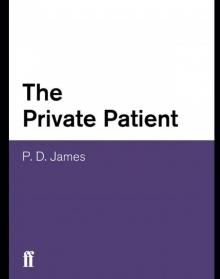 The Private Patient
The Private Patient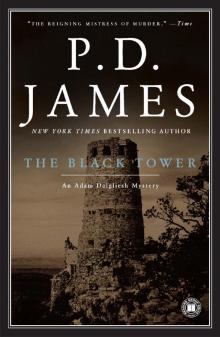 The Black Tower
The Black Tower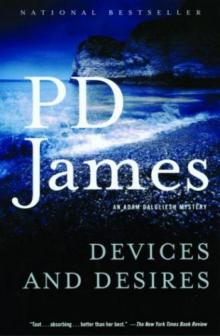 Devices & Desires - Dalgleish 08
Devices & Desires - Dalgleish 08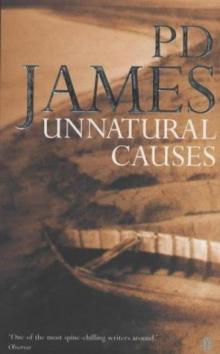 Unnatural Causes
Unnatural Causes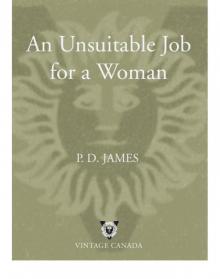 An Unsuitable Job for a Woman
An Unsuitable Job for a Woman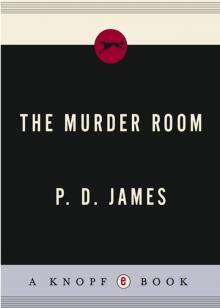 The Murder Room
The Murder Room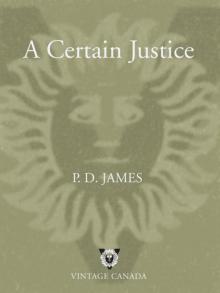 A Certain Justice
A Certain Justice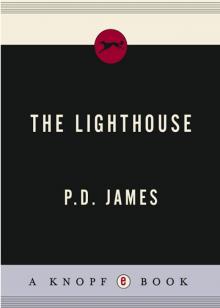 The Lighthouse
The Lighthouse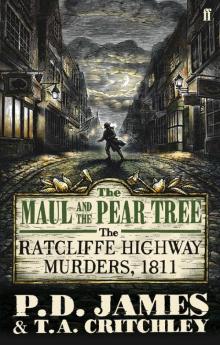 The Maul and the Pear Tree
The Maul and the Pear Tree